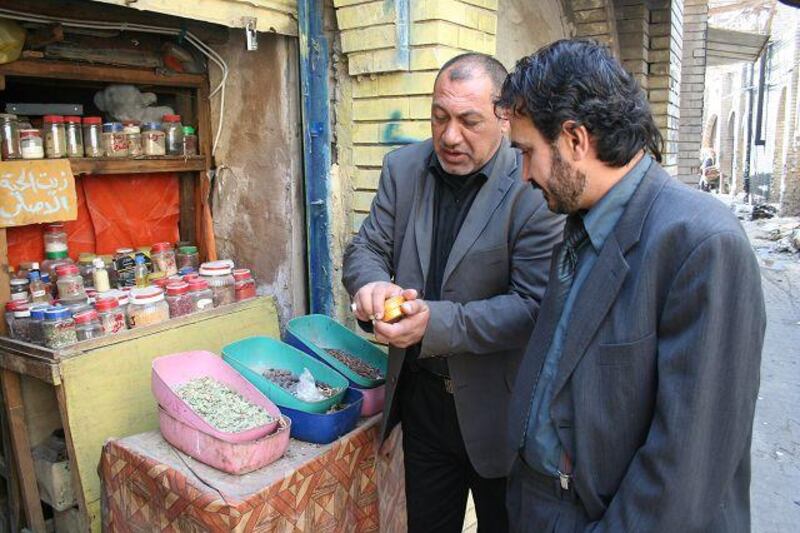BAGHDAD // The crab, which can only come from the city of Basra, has to be carefully crushed in a pestle. The herbs and olive oil are added in careful measure. "After you take this, it just stops all the cancer," said Ali Abu Mazin, 50, one of Baghdad's most respected herbal doctors. As he spoke, he lifted a dead, dry crab off his cluttered desk. "This is the type," he said. Mr Mazin has a shop down a dingy side alley in the Al Shourja area of central Baghdad. The alley is filled with rubbish and stray cats, and the concrete walls are crumbling but, despite appearances, business has never been better for the herbalist. "I am so busy," he said. And it is not just Mr Mazin's shop that is full of activity. Herbal doctors across the capital are enjoying a boom in trade. Unusual concoctions are flying off the shelves faster than ever before. Since the invasion in 2003 - when Iraq's borders opened up after years of isolation - weapons, insurgents and all manner of counterfeit goods, including pharmaceuticals, have flooded into the country. "Nobody knows for sure the source of the medicine. It is unregulated," Faris Abbas, 45, another herbal doctor, said. The sheer number of fake drugs on the market has led to people turning towards herbal doctors and placing their trust in alternative and more traditional treatments. At one stage, between 80 per cent and 90 per cent of all medicines in the private medical sector were found to be fakes. "The private sector was flooded with fake, corrupted medicine; some of it was powder, sugar and white cement," said Adil Mohsin, the inspector general for the ministry of health. The private sector accounts for about 50 per cent of the health market in Iraq. Mr Mazin, the herbalist, said he advised people not to take medicine. "It is fake or expired. Herbs are more healthy and have no side effects." He is unable to offer any concrete evidence that his mixtures work, although he did boast that the crab treatment was effective about 70 per cent of the time. Although many of the treatments used by Mr Mazin and Mr Abbas are passed down by their fathers from one generation to the next, the recent boom in business is unprecedented. "Frankly, the medicine here is useless ? Inside Iraq it is impossible to know what you get. You have to travel outside to trust anything and I don't have the money," said Um Ali, 42, who was buying herbs for a stomach complaint. "Two years ago I used medicine and my whole body felt terrible. Now for the pain in my stomach I take herbs," said Muhanid Moftar, 28, an actor. "It works." With government crackdowns and increased regulation, the percentage of fake medicine has reduced significantly, officials say, but there is still distrust and new dealers keep springing up. "Four people running illegal warehouses and bringing in illegal medicine were arrested just last week," Mr Mohsin, the ministry of health's inspector general, said. Despite government assurances that most of the illegal medicine is now off the shelves, and only accounts for 10 per cent of the market, a trip to a local pharmacy revealed a different story. Talking to the pharmacist, a Dr Haider - who did not want to give his full name because he sold illegal drugs - it was clear that many of the products sold were still fakes. In his clean, modern-looking pharmacy in the Karrada district of Baghdad he showed two nearly identical packets of a pill called Omnic, used to treat prostate problems. One, the original from Holland, cost 18,000 Iraqi dinar (Dh58), the other, a fake, cost 6,000 dinar. "Absolutely, the original is more expensive," he said. "If you took them to the lab you could find out the difference, but I can't tell you." Dr Haider said he had no idea what the ingredients or the dosage in the fake medicine were. Despite continued distrust in the legitimacy of the pharmaceuticals on the market the medical fraternity remains weary of herbal medicine. "I don't believe in alternative medicine," Mr Mohsin said. talbone@thenational.ae
Herbalist delivers a dose of reality
As Iraq is flooded by fake drugs, its people are turning to more traditional treatments instead of conventional cures.

Editor's picks
More from the national




